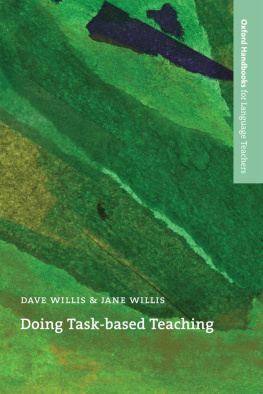Jane Willis - Doing Task-Based Teaching
Here you can read online Jane Willis - Doing Task-Based Teaching full text of the book (entire story) in english for free. Download pdf and epub, get meaning, cover and reviews about this ebook. year: 2013, publisher: Oxford University Press, genre: Home and family. Description of the work, (preface) as well as reviews are available. Best literature library LitArk.com created for fans of good reading and offers a wide selection of genres:
Romance novel
Science fiction
Adventure
Detective
Science
History
Home and family
Prose
Art
Politics
Computer
Non-fiction
Religion
Business
Children
Humor
Choose a favorite category and find really read worthwhile books. Enjoy immersion in the world of imagination, feel the emotions of the characters or learn something new for yourself, make an fascinating discovery.
- Book:Doing Task-Based Teaching
- Author:
- Publisher:Oxford University Press
- Genre:
- Year:2013
- Rating:4 / 5
- Favourites:Add to favourites
- Your mark:
- 80
- 1
- 2
- 3
- 4
- 5
Doing Task-Based Teaching: summary, description and annotation
We offer to read an annotation, description, summary or preface (depends on what the author of the book "Doing Task-Based Teaching" wrote himself). If you haven't found the necessary information about the book — write in the comments, we will try to find it.
Doing Task-Based Teaching — read online for free the complete book (whole text) full work
Below is the text of the book, divided by pages. System saving the place of the last page read, allows you to conveniently read the book "Doing Task-Based Teaching" online for free, without having to search again every time where you left off. Put a bookmark, and you can go to the page where you finished reading at any time.
Font size:
Interval:
Bookmark:
Also published in
Oxford Handbooks for Language Teachers
ESOL: A Critical Guide
Melanie Cooke and James Simpson
The Oxford ESOL Handbook
Philida Schellekens
Teaching American English Pronunciation
Peter Avery and Susan Ehrlich
Success in English Teaching
Paul Davies and Eric Pearse
Doing Second Language Research
James Dean Brown and Theodore S. Rodgers
From Experience to Knowledge
Julian Edge and Sue Garton
Teaching Business English
Mark Ellis and Christine Johnson
Intercultural Business Communication
Robert Gibson
Teaching and Learning in the Language Classroom
Tricia Hedge
Teaching Second Language Reading
Thom Hudson
Teaching English Overseas: An Introduction
Sandra Lee McKay
Teaching English as an International Language
Sandra Lee McKay
How Languages are Learned (3rd edition)
Patsy M. Lightbown and Nina Spada
Teaching Second Language Listening
Tony Lynch
Communication in the Language Classroom
Tony Lynch
Teaching Young Language Learners
Annamaria Pinter
Exploring Learner Language
Elaine Tarone and Bonnie Swierzbin
Doing Task-based Teaching
Jane Willis and Dave Willis
Explaining English Grammar
George Yule
Teaching
Dave Willis and Jane Willis


Great Clarendon Street, Oxford OX2 6 DP
Oxford University Press is a department of the University of Oxford. It furthers the Universitys objective of excellence in research, scholarship, and education by publishing worldwide in
Oxford New York
Auckland Cape Town Dar es Salaam Hong Kong Karachi Kuala Lumpur Madrid Melbourne Mexico City Nairobi New Delhi Shanghai Taipei Toronto
With offices in
Argentina Austria Brazil Chile Czech Republic France Greece Guatemala Hungary Italy Japan Poland Portugal Singapore South Korea Switzerland Thailand Turkey Ukraine Vietnam
OXFORD and OXFORD ENGLISH are registered trade marks of Oxford University Press in the UK and in certain other countries
Oxford University Press 2007
The moral rights of the author have been asserted
Database right Oxford University Press (maker)
First published 2007
2012 2011
10 9 8 7 6 5
All rights reserved. No part of this publication may be reproduced, stored in a retrieval system, or transmitted, in any form or by any means, without the prior permission in writing of Oxford University Press (with the sole exception of photocopying carried out under the conditions stated in the paragraph headed Photocopying), or as expressly permitted by law, or under terms agreed with the appropriate reprographics rights organization. Enquiries concerning reproduction outside the scope of the above should be sent to the ELT Rights Department, Oxford University Press, at the address above
You must not circulate this book in any other binding or cover and you must impose this same condition on any acquirer
Photocopying
The Publisher grants permission for the photocopying of those pages marked photocopiable according to the following conditions. Individual purchasers may make copies for their own use or for use by classes that they teach. School purchasers may make copies for use by staff and students, but this permission does not extend to additional schools or branches Under no circumstances may any part of this book be photocopied for resale
Any websites referred to in this publication are in the public domain and their addresses are provided by Oxford University Press for information only. Oxford University Press disclaims any responsibility for the content
ISBN: 978-0-19-442210-9
Printed in China
This book is printed on paper from certified and well-managed sources.
When we began planning this book, we sent out a request to language teachers worldwide who were involved in TBT. We asked them to send us tasks which had worked well with their learners together with outline lesson plans to go with them. We also asked them what advice they would give to other teachers hoping to implement TBT, and to report difficulties and problems they had encountered themselves and had heard of from colleagues in connection with TBT. The response was magnificent. So first, and most importantly, we would like to thank the contributors listed at the end of this book, not only for sending us their tasks and ideas, but also for responding so willingly to our follow-up requests for more details. Sadly we were unable to find space for all the tasks sent inwe received well over 100but everyones advice has been collated and incorporated at relevant stages in the book, and especially in the final chapter. It is their co-operation that makes this book truly worthy of its title: Doing Task-based Teaching.
Wed also like to thank the large number of teachers and trainers whom we have met and talked to over the past ten years at conferences, workshops, and talks in Argentina, Brazil, Canada, Chile, Germany, Greece, Ireland, Italy, Japan, New Zealand, Pakistan, Portugal, South Korea, Spain, Switzerland, Taiwan, Thailand, Turkey, UAE, UK, and more recently at IATEFL conferences. We would also like to include participants in the TBLT 2005 conference at Leuven who sent us feedback through Steve Mann, who attended that conference. By asking questions and filling in slips of paper in workshop sessions, teachers have, sometimes unwittingly, contributed advice and ideas that have helped to shape this book We should also thank Masters students at Birmingham and Aston Universities who, through their assignments and research, have given us useful insights into classrooms all over the world and demonstrated how TBT can work in practice.
Several peoplewhose names we do not knowread various early outlines and drafts of chapters and commented thoughtfully and constructively on many aspects, helping us to reshape and fine-tune the contents. Steve Mann gave us detailed feedback on the last four chapters, which certainly clarified a few issues for us, and helped to make the final version more readable. Roger Hawkey kindly wrote a short section on testing for our final chapter. We are very grateful to you all and just hope that we have done justice to your suggestions.
Many other people, including former colleagues from Aston University and the University of Birmingham, have helped and encouraged us in many ways. Thanks to all of you, too.
Doing Task-based Teaching has been written for language teachers who want to gain a better understanding of how task-based teaching (TBT) works in practice. It aims to give beginner teachers the confidence to start using tasks in their lessons, and help experienced teachers to widen their repertoire of tasks and task sequences. It draws on the classroom experiences not only of the writers themselves, but of over 30 teachers in twelve different countries. These committed teachers have sent in examples of tasks they have designed and used successfully in their lessons. In the book we take further account of the realities of the classroom by looking at ways of combining a task-based approach with current coursebooks.
begins by exploring some commonly held views on TBT and addressing some common misconceptions. It distinguishes between approaches that begin with a focus on grammatical form and those that begin with a focus on meaning, and looks at the principles that underpin them. It explores the meaning of the term task and argues that a teacher-controlled focus on grammar should come at the end of a task cycle.
Font size:
Interval:
Bookmark:
Similar books «Doing Task-Based Teaching»
Look at similar books to Doing Task-Based Teaching. We have selected literature similar in name and meaning in the hope of providing readers with more options to find new, interesting, not yet read works.
Discussion, reviews of the book Doing Task-Based Teaching and just readers' own opinions. Leave your comments, write what you think about the work, its meaning or the main characters. Specify what exactly you liked and what you didn't like, and why you think so.












